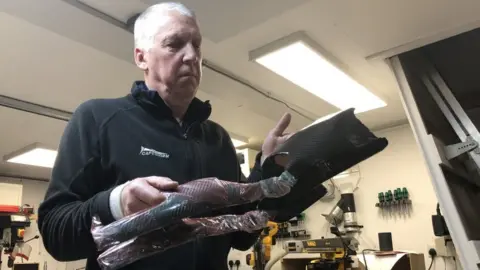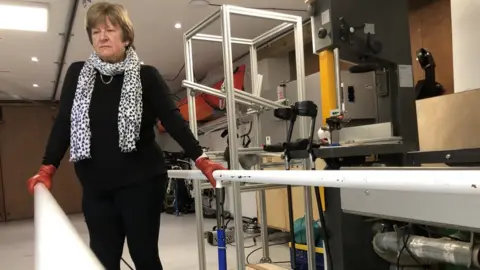Man builds wife 'exoskeleton' after cancer surgery
 BBC
BBCA woman is learning to walk again with the aid of an "exoskeleton" built by her husband after he taught himself the basics of computer aided design.
In 2016, Jane Fryer, from Devon, was told she needed her right hip and half her pelvis removed due to bone cancer.
The operation saved her life but surgeons told her she would never walk again without the aid of crutches.
Mrs Fryer said she could "walk unaided" in the brace designed by her husband Paul in their garage.
Having retired from a career in computer sales and marketing, he had no engineering background but wanted to see if he could make something to help his wife walk again.
'Incredibly complex'
Mr Fryer, from Colyford, taught himself the basics of computer aided design and sought advice from experts in prosthetics and physiotherapy.
He said: "I thought how hard can it be? Well quite hard is the answer.
"What we had to do was try and recreate the human hip which is an incredibly complex joint.
"Jane lost all the attachment points where muscles are connected to the skeleton so we had to create a true exoskeleton."
Mr Fryer began the project during the Covid lockdown and had a working prototype within three years.

Wearing the carbon fibre exoskeleton in their garage, Mrs Fryer can take independent steps forward with the option to hold onto a support bar if required.
She said: "Its early days and we are working slowly and methodically but we are hoping to be able to perfect this so that I can walk greater distances unaided."
Prosthetics expert David House, who has been working on the design with Mr Fryer said there was "nothing like this" available at the moment.
He said: "This is something completely new, completely innovative and has made the world of difference to Jane in terms of her being able to walk unaided."
Mr Fryer wants to secure funding to continue research and development into the device.
He said he hoped it could one day help anyone who was unable to receive hip replacement surgery.

Follow BBC Devon on X (formerly Twitter), Facebook and Instagram. Send your story ideas to [email protected].
